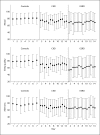Sleep quality, mood, alertness and their variability in CKD and ESRD
- PMID: 20090370
- PMCID: PMC2865402
- DOI: 10.1159/000276580
Sleep quality, mood, alertness and their variability in CKD and ESRD
Abstract
Background/aims: Little is known about the association of chronic kidney disease (CKD) with sleep quality, mood, and alertness. In this report, we assessed these symptoms among patients with advanced CKD (stages 4-5) and those with end-stage renal disease (ESRD) and compared them to healthy controls without known kidney disease.
Methods: Patients were recruited from local dialysis units, outpatient nephrology clinics and the Thomas E. Starzl Transplant Institute. Healthy control subjects matched for age, gender and race were drawn from an archival database. Daily symptoms of sleep quality, mood, and alertness were assessed by visual analogue scales of the Pittsburgh Sleep Diary. Health-related quality of life was assessed by the Short Form-36 instrument.
Results: Sixty-nine dialysis patients and 23patients with advanced CKD demonstrated worse scores in sleep quality, mood, and alertness (p < 0.001) than controls. In adjusted analyses, European-American race, dialysis dependency, younger age, and physical performance SF-36 components were significantly associated with poor sleep quality, mood and alertness (p < 0.05). The dialysis population demonstrated higher day-to-day variability in scores than either the advanced CKD patients or the controls.
Conclusion: Advanced CKD and dialysis dependency are associated with impaired and highly variable sleep quality, mood, and alertness.
Copyright 2010 S. Karger AG, Basel.
Figures


References
-
- Unruh ML, Weisbord SD, Kimmel PL. Health-related quality of life in nephrology research and clinical practice. Semin Dial. 2005;18:82–90. - PubMed
-
- Ramkumar N, Beddhu S, Eggers P, Pappas LM, Cheung AK. Patient preferences for in-center intense hemodialysis. Hemodial Int. 2005;9:281–295. - PubMed
-
- Unruh ML, Hartunian MG, Chapman MM, Jaber BL. Sleep quality and clinical correlates in patients on maintenance dialysis. Clin Nephrol. 2003;59:280–288. - PubMed
-
- Son YJ, Choi KS, Park YR, Bae JS, Lee JB. Depression, symptoms and the quality of life in patients on hemodialysis for end-stage renal disease. Am J Nephrol. 2009;29:36–42. - PubMed
Publication types
MeSH terms
Grants and funding
LinkOut - more resources
Full Text Sources
Medical

